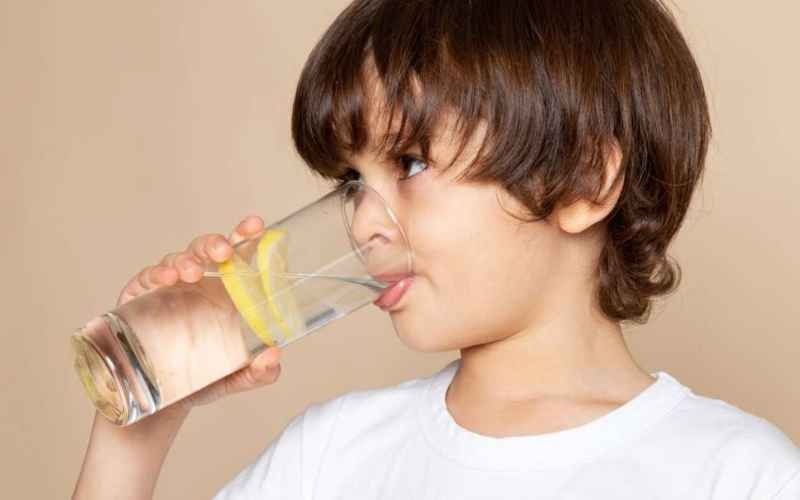As the summer sun graces us with its warmth, parents gear up for a season filled with outdoor adventures, pool parties, and endless fun under the sun. However, amidst the excitement, it’s crucial to remember the importance of staying hydrated, especially for our little ones. With rising temperatures and increased outdoor activities, ensuring adequate hydration for children becomes paramount.
Summer Is Here: What Parents Should Know About Kids’ Hydration

Summer Is Here: What Parents Should Know About Kids’ Hydration
As the summer sun makes its grand entrance, casting its warm embrace upon us, parents eagerly anticipate a season brimming with outdoor escapades, splashing pool parties, and boundless joy under the radiant sky. It’s a time when families come together to bask in the beauty of nature and create cherished memories that will last a lifetime. However, amid the whirlwind of excitement and adventure, there lies a critical responsibility that should never be overlooked: ensuring the well-being and hydration of our little ones.
With each passing day, temperatures soar, and the sun’s rays beat down with relentless intensity. As children frolic in the sunshine, engaging in spirited games and energetic activities, their bodies are working overtime to regulate temperature and maintain equilibrium. With increased outdoor play comes a corresponding rise in the body’s demand for hydration. Sweat beads glisten upon their brows, a testament to the exertion and energy expended in the pursuit of summertime fun.
It’s during these scorching days of summer that the importance of hydration becomes glaringly evident. Water, the elixir of life, becomes more than just a thirst-quenching beverage; it becomes a vital necessity for survival. For our little ones, whose bodies are still developing and whose reserves are more delicate, adequate hydration is paramount to their health and well-being.
As parents, it falls upon us to be vigilant guardians of our children’s hydration levels. We must be ever mindful of the signs of dehydration, such as dry lips, sunken eyes, and lethargy, and act swiftly to remedy any imbalances. In the midst of the summer bustle, it’s easy for children to become swept up in the excitement and forget to drink enough water. Thus, it becomes our duty to gently remind and encourage them to hydrate regularly, offering refreshing sips of water as a gentle nudge towards wellness.
So, as we embark on this summer adventure with our little ones in tow, let us not forget the importance of staying hydrated amidst the sea of outdoor delights. Let us equip ourselves with water bottles brimming with cool refreshment and arm ourselves with the knowledge and awareness to recognize the signs of dehydration. For in doing so, we not only safeguard the health and vitality of our children but also ensure that this summer season is one filled with joy, laughter, and endless hydration.
In this blog, we’ll delve into why hydration matters, signs of dehydration, and practical tips for parents to keep their kids hydrated and healthy throughout the summer months.
Why Hydration Matters:
Water is the lifeblood of our bodies, playing a crucial role in virtually every bodily function. As the mercury rises and the summer heat intensifies, the importance of hydration cannot be overstated. This is especially true for children, whose bodies have higher water requirements relative to their body weight compared to adults.
During the summer months, as children engage in lively outdoor activities and frolic in the sun’s warmth, their bodies work tirelessly to regulate temperature and maintain equilibrium. Sweat pours from their pores, serving as the body’s natural cooling mechanism. However, with each droplet of sweat lost, precious fluids and electrolytes are depleted, making hydration all the more imperative.
Dehydration, the consequence of inadequate fluid intake, can manifest in various forms, ranging from mild discomfort to severe health complications. In the sweltering heat of summer, dehydration becomes a lurking threat, waiting to pounce on unsuspecting victims. Symptoms such as dry mouth, thirst, fatigue, and dizziness serve as red flags, signaling the body’s desperate plea for replenishment.
For children, whose bodies are still developing and whose reserves are more delicate, the effects of dehydration can be particularly pronounced. Without sufficient hydration, they become vulnerable to a myriad of health issues, including heat exhaustion and heatstroke. These conditions, characterized by elevated body temperature, rapid heartbeat, and altered mental status, pose a grave threat to their well-being and require immediate medical attention.
Thus, the significance of hydration during the summer months cannot be overstated. It is not merely a matter of quenching thirst but rather a vital component of maintaining optimal health and vitality. By ensuring that our children remain adequately hydrated, we safeguard their well-being, allowing them to revel in the joys of summer without succumbing to the perils of dehydration. So, let us raise our glasses, filled to the brim with cool refreshment, and toast to a summer filled with hydration, health, and happiness.
Signs of Dehydration in Children:
Recognizing the signs of dehydration in children is crucial for prompt intervention. Some common symptoms include:
- Dry or Sticky Mouth: One of the early signs of dehydration in children is a dry or sticky sensation in the mouth.
- Thirst: Children may express increased thirst as their bodies attempt to compensate for fluid loss.
- Fatigue or Irritability: Dehydration can lead to fatigue or irritability in children, impacting their mood and energy levels.
- Headache: Children experiencing dehydration may complain of headaches, which can be a result of electrolyte imbalances.
- Dark Yellow Urine or Infrequent Urination: Dark yellow urine or infrequent urination may indicate dehydration, as the body conserves water by producing less urine.
- Dizziness or Lightheadedness: Dehydration can cause dizziness or lightheadedness, especially when standing up quickly.
- Sunken Eyes: In severe cases of dehydration, children may exhibit sunken eyes due to the loss of fluid volume.
- Lack of Tears When Crying: A lack of tears when crying can also be a sign of dehydration, as tears require adequate hydration to be produced.
It’s essential for caregivers and parents to be vigilant for these signs and seek medical attention if they suspect their child is dehydrated. Prompt rehydration is crucial to prevent complications and ensure the child’s well-being.
Tips for Keeping Kids Hydrated:
Ensuring that children stay adequately hydrated is essential for their overall health and well-being. Here are some tips to help keep kids hydrated:
- Encourage Regular Fluid Intake: Prompt your child to drink fluids regularly throughout the day, even if they don’t feel thirsty. Offer options like water, diluted fruit juices, or electrolyte-rich beverages to keep them hydrated.
- Lead by Example: Children often imitate the behaviors of their parents. Make hydration a family activity by drinking water together and setting a positive example for your children to follow.
- Pack Hydration Packs: When venturing outdoors, pack hydration packs or water bottles for each family member. Ensure they are easily accessible, allowing children to sip water whenever they feel the need to hydrate.
- Offer Hydrating Snacks: Incorporate hydrating foods into your child’s diet, such as watermelon, cucumber, oranges, and strawberries. Not only do these foods provide water content, but they also supply essential vitamins and minerals to support overall health.
- Monitor Activity Levels: During vigorous physical activities, children sweat more and lose fluids rapidly. Encourage frequent water breaks and consider providing electrolyte replacement drinks for longer duration activities to replenish lost minerals.
- Create Fun Hydration Games: Transform hydration into an enjoyable activity by setting goals for water intake or using colorful reusable water bottles with markers to track how much they’ve consumed throughout the day. Making hydration fun can motivate children to drink more water regularly.
By implementing these tips, you can help ensure that your child remains adequately hydrated, promoting their overall health and well-being.
Conclusion:
As parents, it’s our responsibility to prioritize our children’s health, especially during the hot summer months. By staying vigilant about hydration, recognizing the signs of dehydration, and implementing practical strategies to keep our kids hydrated, we can ensure they enjoy a safe and fun-filled summer season. Remember, when it comes to hydration, it’s better to be proactive rather than reactive. So, let’s raise a toast to a summer filled with happy, hydrated kids!
Top 20 FAQs about Summer: What Parents Should Know About Kids’ Hydration
1. Why is hydration important for children during the summer?
- Hydration is crucial for children during the summer to prevent dehydration, maintain overall health, and support their active lifestyles.
2. How much water should my child drink during hot weather?
- Children should drink plenty of fluids throughout the day, aiming for at least 6-8 glasses of water, depending on their age and activity level.
3. What are some signs that my child may be dehydrated?
- Signs of dehydration in children include dry mouth, thirst, fatigue, dark yellow urine, dizziness, and lack of tears when crying.
4. Are certain children more at risk of dehydration during summer?
- Yes, children who are active outdoors, participate in sports, or have certain medical conditions like fever or diarrhea are at higher risk of dehydration.
5. Can my child stay hydrated by drinking only water?
- While water is essential, children can also stay hydrated by consuming other fluids like diluted fruit juices, electrolyte-rich drinks, and eating hydrating foods.
6. How can I encourage my child to drink more water?
- Encourage your child to drink water regularly by leading by example, offering flavored water, using fun water bottles, and setting hydration goals.
7. Are sports drinks better than water for hydration during physical activities?
- Sports drinks containing electrolytes can be beneficial for children engaging in prolonged, intense physical activities to replenish lost minerals. However, for everyday hydration, water is sufficient.
8. How can I ensure my child stays hydrated while playing sports outdoors?
- Ensure your child drinks water before, during, and after sports activities, takes frequent breaks, and consider providing electrolyte replacement drinks for longer sessions.
9. What are some hydrating foods I can include in my child’s diet?
- Hydrating foods like watermelon, cucumbers, oranges, strawberries, and yogurt can contribute to your child’s overall fluid intake.
10. Can my child drink too much water?
- While rare, excessive water intake can lead to a condition called hyponatremia, where sodium levels in the blood become dangerously low. Encourage balanced fluid intake.
11. How can I recognize heat-related illnesses in my child?
- Symptoms of heat-related illnesses include nausea, vomiting, headache, rapid heartbeat, and confusion. Seek medical attention if you suspect heat exhaustion or heatstroke.
12. Is it safe for my child to swim after eating?
- While the “wait 30 minutes after eating before swimming” rule is a myth, encourage your child to take breaks and avoid heavy meals before swimming to prevent cramps.
13. Can my baby drink water during summer?
- If your baby is exclusively breastfed, they typically don’t need additional water until they start consuming solid foods. Consult your pediatrician for guidance.
14. How can I protect my child from dehydration while traveling during summer?
- Ensure your child drinks plenty of fluids during travel, pack a refillable water bottle, and avoid excessive sun exposure.
15. What should I do if my child refuses to drink water?
- Offer alternative fluids like diluted fruit juices or flavored water, incorporate hydrating foods into their diet, and lead by example by drinking water yourself.
16. Can certain medications increase the risk of dehydration in children?
- Yes, some medications like diuretics or those that cause increased sweating can contribute to dehydration. Consult your healthcare provider for guidance.
17. How can I help my child recover from dehydration?
- Encourage your child to drink small amounts of water or oral rehydration solutions, offer bland foods, and seek medical attention if symptoms persist or worsen.
18. Are there any warning signs of severe dehydration that I should watch out for?
- Warning signs of severe dehydration include extreme thirst, rapid heartbeat, sunken eyes, confusion, and little to no urine output. Seek immediate medical help if you notice these symptoms.
19. Can dehydration lead to other health complications in children?
- Yes, severe dehydration can lead to heat exhaustion, heatstroke, kidney problems, and electrolyte imbalances, which can be life-threatening if left untreated.
20. How can I ensure my child maintains proper hydration throughout the summer?
- Encourage regular fluid intake, monitor activity levels, offer hydrating snacks, lead by example, and be vigilant for signs of dehydration to ensure your child stays hydrated and healthy during the summer months.


